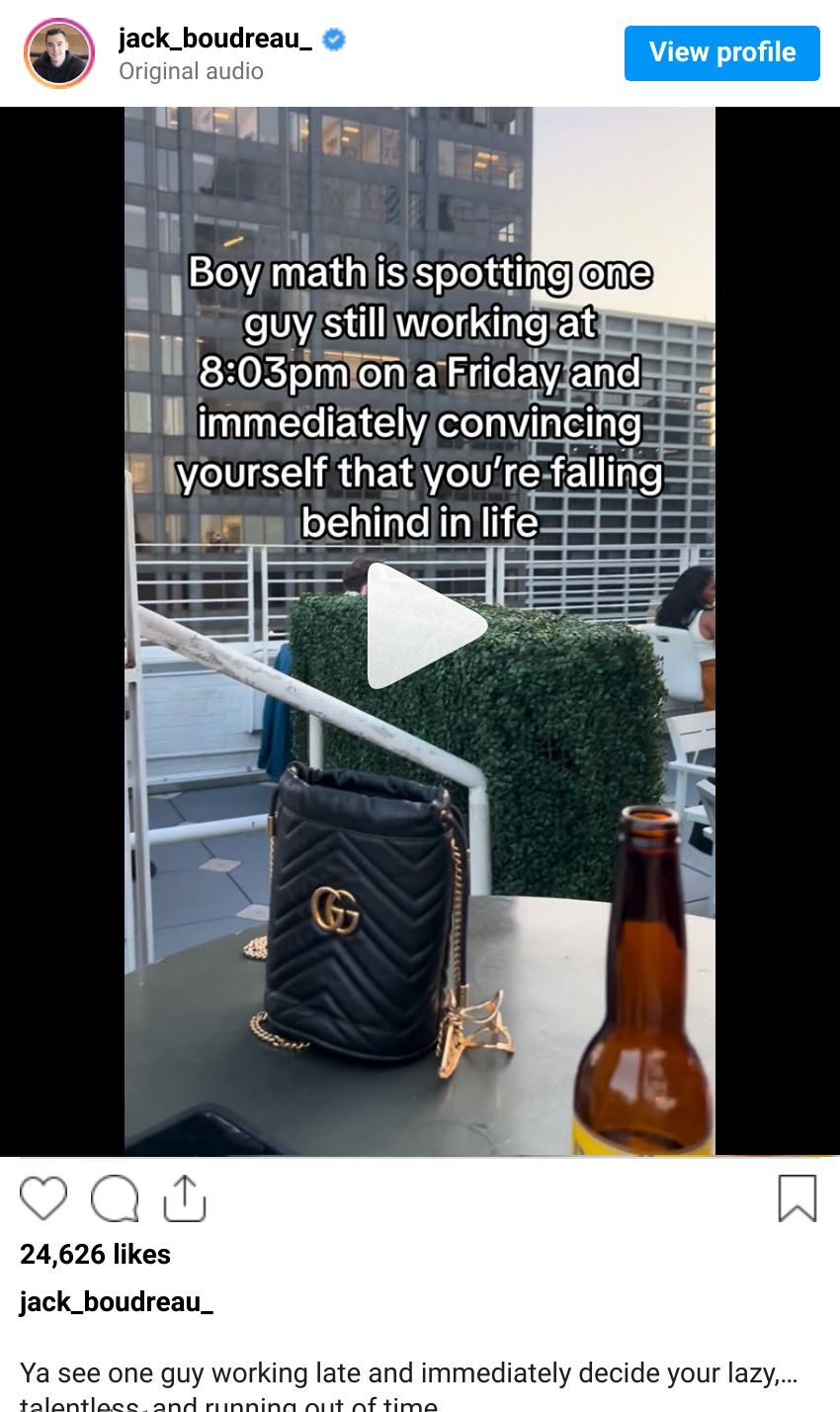Sponsored Ad
Training The Street
Training The Street is the industry-standard training used by analysts at banks like JPMorgan, Goldman, Morgan Stanley, and Evercore. They’ve helped thousands of students and career-changers break into IB, PE, VC, and beyond.
They’ve got you covered with: a full Investment Banking Bundle, discounted 25% off for my readers (code: HABITS25)
Training The Street is where the pros go to prep.
Top Content From Last Week
Boy Math vs. Girl Math
I don’t blame you if you’re not familiar with the terms “Boy Math” or “Girl Math.” Point being, their social media terms to phrase funny explanations why we justify certain career moves, spending habits, or life choices.
It eclipsed over 1M views in a few days. Pretty wild.
Main Story:
The Days You Don’t Feel Like It
This week, our team had a long conversation about burnout. The kind that makes your coffee taste flat, your focus scatter, and your brain quietly ask, “Why am I doing this again?”
Burnout sneaks up on everyone…founders, employees, parents, even people who feel like they’re “doing everything right.” And it doesn’t just show up at work. It seeps into your finances, your health, your relationships, literally everything.
But the older I get, the more I realize the goal isn’t to avoid burnout entirely. It’s to manage it. Because long-term consistency will always beat short-term intensity.
Burnout at Work
A few weeks ago, I had one of those weeks that sounds impressive until you live through it.
Monday night I flew to D.C. for meetings and an investor pitch with about 50 angels in the room. On Wednesday morning I flew to New York to host some of our team at a VIP event at Ramp HQ.

recognize the accountant in the back?
The following night I had a FinTech founders dinner hosted by one of our board observers. Thursday morning I flew to Houston. Friday I flew again…this time to Chicago to visit my brother and then drove to South Bend for the USC vs. Notre Dame game.
Five cities in six days. And that’s not an unusual week.
When you’re building something early, you live in this weird paradox, the faster you move, the more you realize how unsustainable your speed is. You start confusing exhaustion with momentum.
But real progress rarely comes from weeks like that. It comes from the quieter ones. The weeks where nothing flashy happens, where you’re refining systems, checking in with your team, and slowly compounding the boring stuff.
Rest isn’t the opposite of progress. It’s what makes progress possible.
Burnout in Finances
When I was in college, I worked at a Charles Schwab call center. Mondays, Wednesdays, Fridays. We’re talking 6am starts, headset on, coffee in hand. It wasn’t glamorous, but it paid well for a college job, and I learned more about people and their financial stress in a couple semesters than I had in four years of class.
I used to take calls from folks panicking over their accounts, trying to trade pre-market, forgetting passwords, accusing the world of being against them. I’d hang up and realize that even the smallest amount of money can trigger massive emotions.
Those early years taught me that money burnout is real. You can save diligently, invest perfectly, and still hit a wall where it all feels pointless. You start asking, What’s the point of all this saving if I can’t enjoy any of it?
I’ve seen it happen over and over, people getting so tired of being disciplined that they overcorrect. They quit their job, buy the car, invest in something risky, or splurge just to feel alive again.
The same rule that applies to building a company applies to managing money:
Slow, steady effort beats bursts of brilliance.
Discipline is hard. Patience is harder. But endurance wins every time.
The Point of It All
When I talk about burnout now (whether with my team or other founders) I don’t mean it in a motivational way. I mean it in a survival way.
Because burnout doesn’t mean you’re weak. It usually means you’ve been strong for too long. It’s the invisible tax of caring deeply about what you’re building: your business, your finances, your life. And while it’s unavoidable, it is manageable.
One of the most freeing lessons I’ve learned is that “doing enough” really is enough. You can have off days. You can rest. You can coast for a bit. None of that means you’re falling behind.
Because the goal isn’t to be the most intense person in the room. It’s to still be standing when everyone else burns out.
The secret to winning long term is showing up, especially on the days you don’t feel like it.
Feedback for Jack
Did you like this email?
Enjoyed this newsletter? Forward it to a friend or use the referral link below!

Sharing Is Caring
Do me a favor, if you enjoy this, share it with a friend!

